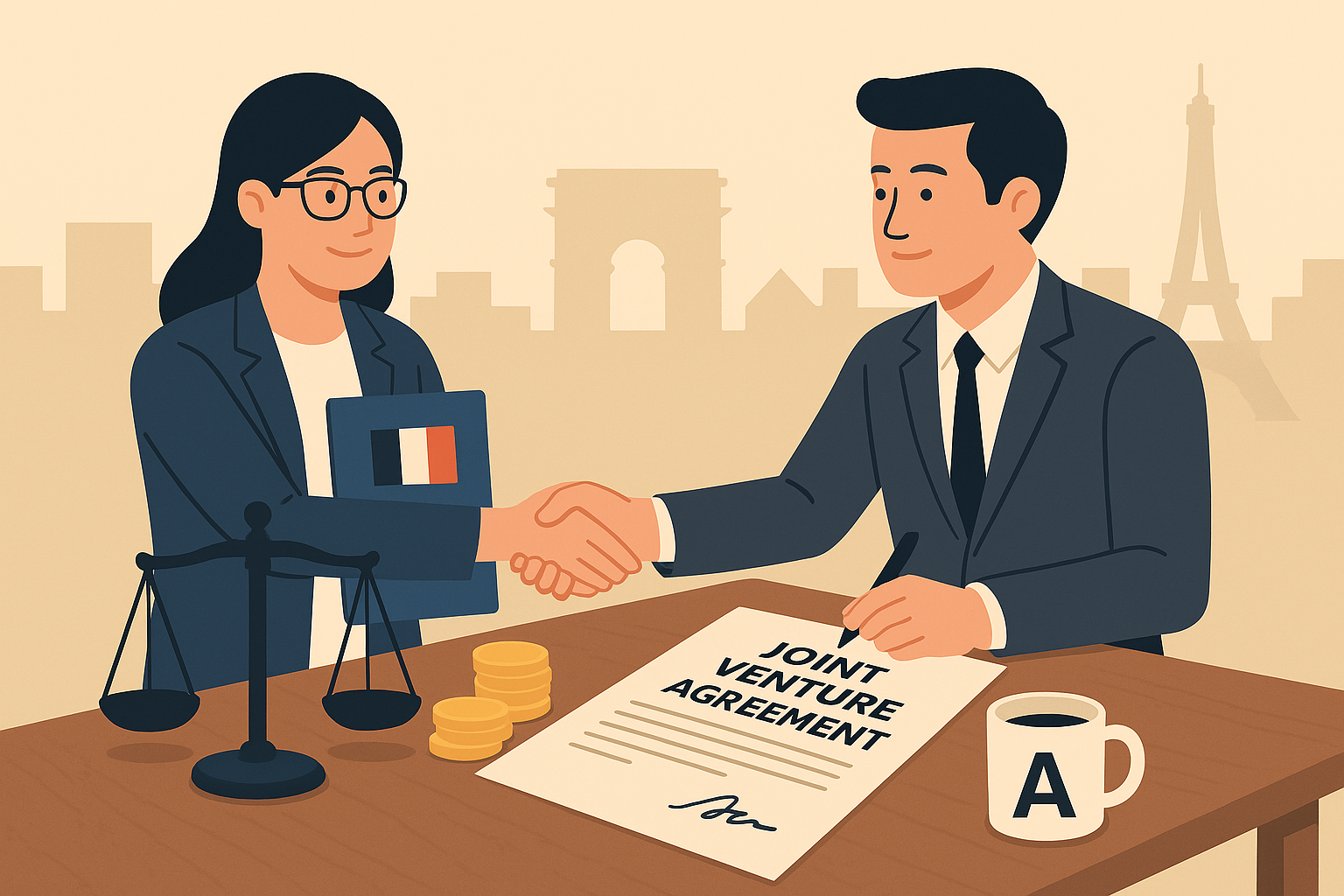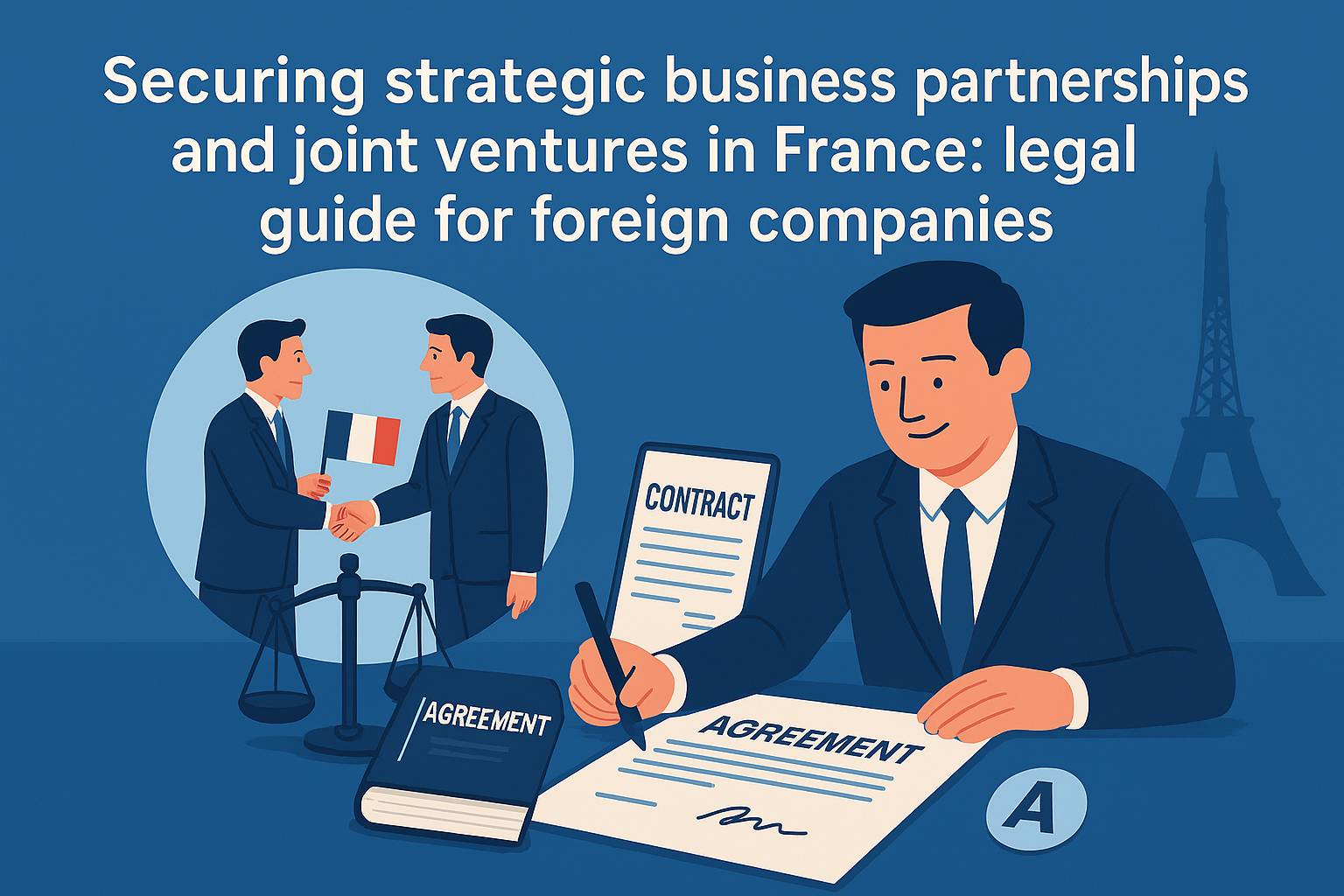Securing strategic business partnerships and Joint Ventures in France: Legal guide for foreign companies
Introduction: Collaborating the French way
France offers fertile ground for strategic business partnerships and joint ventures (JVs), whether to access new markets, combine expertise, or pursue large projects. Foreign companies often join forces with French firms to leverage local know-how, share costs, or fulfill local content requirements. However, a partnership or JV can be as complex as a marriage – the legal framework you establish at the outset largely determines whether the collaboration will thrive or falter.
It’s important to note that under French law, there is no special legal entity called a “joint venture” per se. Instead, you have options: you can form a new jointly-owned company (often the preferred method), or you can operate under a contractual alliance without creating a separate entity. Each route has its benefits and legal implications. This guide walks foreign companies through the key legal considerations to secure a strategic partnership or JV in France – from choosing the right structure, to drafting robust agreements, to navigating regulatory and cultural factors.


Choosing the Right Structure: Contractual vs Corporate Joint Ventures
As mentioned, French law recognizes two broad JV structures:
- Contractual Joint Venture: Two (or more) companies collaborate based on a contract without forming a new legal entity. Examples include consortium agreements, collaboration contracts, or a French-specific form like the société en participation (an undisclosed partnership).
- Corporate Joint Venture: The partners incorporate a jointly-owned company (most commonly an SAS – Société par Actions Simplifiée) in which each party holds shares and which carries out the JV’s business.
Contractual JV: This is relatively quick to set up – essentially just an agreement outlining each party’s contributions, roles, profit-sharing, and duration of the cooperation. It’s suitable for short-term projects (e.g., two companies jointly bidding on a single construction project might form a groupement momentané d’entreprises, which is contractual). It allows each party to remain independent and simply pool efforts for specific tasks. The downside is, without a separate vehicle, liabilities and management remain with the individual companies. For instance, in a simple consortium, if one partner fails to perform, the other might still be fully liable to the client under joint liability principles commonly found in consortium contracts. Also, contractual JVs can lack permanence; if you envision building a lasting business together (beyond a specific project), a purely contractual tie may be too flimsy.
One interesting hybrid in France is the Economic Interest Grouping (GIE). A GIE is a registered entity created by two or more companies to carry out ancillary activities that support its members’ businesses. For example, several companies might form a GIE to share a research lab or joint purchasing office. A GIE has legal personality and can sign contracts, but it’s not meant to make profits for itself (any profits are supposed to be passed to members or used to further the group’s purpose). Members of a GIE have unlimited joint liability for the GIE’s debts, which is a significant consideration. A GIE is flexible in organization and is often easier to run than a full corporation (it’s something of an intermediate between a company and an association). Foreign companies do use GIEs in some cases, for example, to form a joint export marketing consortium. However, because of the liability issue, many prefer a limited liability company form for any substantial venture.
Corporate JV: If the partnership is meant to operate a business venture on an ongoing basis, forming a company is usually the more secure route. The most popular choice is an SAS (simplified joint-stock company) as the JV vehicle, due to its flexibility and minimal constraints. An SAS allows the partners (shareholders) to craft the bylaws to their needs – governance, veto rights, profit distribution preferences, etc., can all be customized. Liability is limited to the company: each partner’s risk is basically their capital contribution, not their entire net worth, which is a major advantage over a GIE or partnership. SAS also has no minimum capital and can even be formed with one shareholder (though in a JV you’ll have at least two). It’s often said that the SAS is the preferred vehicle for international joint ventures in France, and for good reason – it accommodates foreign corporate shareholders easily and has fewer rigid rules than the SA (public company).
Alternatively, a JV could be a SARL (private limited company) if the partners want a more classic small-company form. But SARL shares are a bit less flexible (transfer to third parties requires 50% existing shareholder approval unless waived, etc.), and governance is less adaptable. For most strategic partnerships, SAS is chosen unless there’s a special reason.
One specialized corporate form to be aware of is the Société d’Economie Mixte (SEM) – this is a semi-public company often used when partnering with French public authorities (like a city or public entity owning part of the JV). If your strategic partnership involves a government shareholder (for example, a foreign investor + a French public authority building an infrastructure), an SEM framework might be imposed by law. SEMs have their own rules (like public procurement obligations for certain deals).
Key takeaway: Define your goals and risk tolerance. For a short, defined project or joint service offering, a contractual JV might suffice and save you administrative hassle. For a long-term venture aiming to generate profits and perhaps even have its own workforce and assets, a corporate JV (SAS) gives a clearer structure, easier equity adjustments, and liability shielding.
Crafting the Joint Venture Agreement: Governance, Contributions, and Exit
Once you have the structure, the heart of securing your partnership is the joint venture agreement (in a corporate JV, this often takes the form of a Shareholders’ Agreement alongside the bylaws). This agreement, whether purely contract or between shareholders of a JV company, sets the rules of the road:
Contributions and Financing: Clearly state who contributes what. In a corporate JV, this will be share capital (cash, assets, or possibly services if SAS allows apport en industrie under certain conditions). Ensure any promised non-cash contributions (e.g., technology license, provision of personnel, equipment) are detailed. For example, if one partner is contributing a patent license royalty-free to the JV, the agreement should formalize that license and its terms (and often attach it as a schedule). Decide how the JV will be funded if it needs more money – do partners have obligations to provide additional capital or loans? If one partner fails to fund, will their equity be diluted or could it trigger a dissolution? These terms prevent future disputes about funding responsibilities.
Governance and Control: Decide on the management structure. In an SAS JV, you have a lot of freedom. Commonly, each partner will want representation in decisions proportional to their stake (though not always exactly – sometimes a minority partner still gets veto rights on key matters). Typical arrangements:
- A board of directors or steering committee with seats allocated (e.g., each partner appoints 2 members, and maybe one independent). The powers of this board vs the president/CEO should be delineated.
- Who appoints the CEO/President of the JV? Sometimes one partner gets to name the CEO and the other the CFO, etc., or rotation over time.
- Reserved Matters/Vetoes: List the strategic decisions that require mutual consent or supermajority – e.g., amending bylaws, issuing new shares, taking on large debt, approving budget, entering/exiting key contracts, hiring top executives, etc. Under French law, you cannot give a contractual veto on increasing capital or certain shareholder decisions that would be binding against corporate law (shareholders ultimately have statutory rights), but you can agree that partners will vote together to block or approve certain actions. If a partner violates that voting agreement, it’s a breach of contract (potential damages). In an SAS, you can also bake some of these veto rights into the bylaws as special consent requirements, which makes them enforceable erga omnes (but caution: overly restrictive bylaws can be struck if they paralyze the company, and any bylaw clauses must comply with the Commercial Code’s SAS provisions).
- Day-to-day operations: Often one partner (maybe the local French one) will operate the JV (provide management or premises). Clarify delegation: will certain functions be outsourced to the partners or is the JV autonomous? If your strategic partner is contributing employees to work for the JV, decide whether they’ll be seconded or hired by the JV. Who bears the cost?
Profit Sharing and Dividends: In a contractual JV, you’ll agree how to split revenues or profits from the project. In a corporate JV, dividends usually follow share ownership, but you might have specifics (for instance, a minimum dividend payout ratio, or reinvestment policy). Note that in an SAS, you can create different classes of shares (like one class gets preferred dividends, etc.) if needed.
Competition and Non-Compete: Partners often agree not to compete with the JV’s business or solicit its customers for themselves, at least for the duration of the JV and sometimes a period after. Under EU/French competition law, such non-competes in a JV context are generally allowed if they are reasonably necessary for the JV’s purpose (ancillary restraints) and limited in scope/duration. You’d include a clause that neither party will engage in a business that directly competes with the JV in the territory, or if they do, perhaps the other can exit or gets compensated. Careful: if both partners are competitors, the JV itself must be bona fide full-function, otherwise the arrangement can raise antitrust issues if it’s essentially market-sharing. Generally, though, legitimate joint ventures (especially if they produce something new or enter new markets) are not problematic, but consult a competition lawyer if, say, two large competitors form a JV – you might need to notify it to antitrust authorities, as a full-function JV is considered a concentration subject to merger control if thresholds met, while a non-full-function JV where parents continue to compete might fall under ongoing Article 101 TFEU scrutiny.
IP and Confidentiality: Many strategic partnerships involve sharing intellectual property or know-how. Your agreement should define who owns any jointly developed IP. Often it’s good to say that anything developed by the JV belongs to the JV, but what if the JV ends? Possibly each party gets a license. Or maybe each party retains ownership of what it brought in, and new IP gets licensed to both for use after. This can get complex – the key is to avoid fights later by spelling it out now. Always include strong confidentiality obligations, surviving even if the JV ends, to protect sensitive information each side learns about the other.
Exit and Deadlock Provisions: Perhaps the most important aspect in JV agreements: planning for when things go wrong or circumstances change.
- Deadlock resolution: If the partners are 50/50 or in a situation where they might disagree, have a mechanism. This could be escalation (dispute goes to CEO of each parent company to negotiate), mediation, or ultimately a buy-sell clause. A common deadlock breaker is a Texas shoot-out or Russian roulette clause: one party offers to buy the other’s shares at a certain price; the other must either accept or buy the first party’s shares at that same price. This ensures one or the other ends up owning the JV if they can’t work together. Another is a put/call option: e.g., if deadlock on major issue persists 60 days, Partner A has right to sell its shares to Partner B at a formula price (put), or vice versa (call). French law allows such options (since 2018 reform, unilateral promises to buy/sell shares at agreed price/formula are enforceable as long as timeframe and price determined). Just be cautious to draft them clearly.
- Term/Exit: Is the JV for a fixed term (e.g., a 5-year cooperation) or indefinite? If indefinite, under French law any shareholder can typically exit an SAS by selling shares (unless restricted), but you might want to lock in a period during which neither party can freely transfer their interest. Often JVs have pre-emption rights if one partner wants to sell to a third party – giving the other a right of first refusal or first offer to keep control. You may also agree on tag-along and drag-along rights: if one partner finds a buyer for the whole JV, can they force the other to sell (drag-along)? Or if one sells, can the other tag along to sell their stake on the same terms? These protect minority or ensure partners exit together if intended.
- Termination events: list what causes an early termination. Breach of agreement? Change of control of one partner (maybe you don’t want to be in JV if your partner is acquired by your competitor)? Insolvency of a partner? And what happens upon termination – often the agreement will say one partner can buy out the other, or if neither buys, then liquidate the JV company.
Liability and Indemnities: In a contractual JV, you might include mutual indemnities (each party responsible for its own folks’ negligence, etc.). In a corporate JV, the JV itself will likely indemnify directors, and each party might indemnify the other for breaches of the JV agreement.
Putting all these elements in a clear written agreement is vital. Without it, you rely on default law which may not suit your joint venture’s needs. A well-drafted JV contract is your safety net to handle conflicts without implosion.
Legal and Regulatory Considerations for Partnerships
Foreign companies must also consider a few external legal factors when partnering in France:
- Competition Law: As already touched on, ensure the collaboration doesn’t run afoul of antitrust rules. If the JV is essentially a way to fix prices or allocate market between competitors, it will be illegal under Article 101 TFEU. Genuine joint ventures that involve integration (like pooling resources to make a new product) are generally fine, but always vet the arrangement with competition counsel. The European Commission’s Horizontal Cooperation Guidelines provide a framework on what kinds of cooperation (R&D joint venture, production joint venture, etc.) are acceptable and what restrictions (like non-competes or information sharing) are permissible. If in doubt, err on the side of caution and structure the deal to comply (or seek comfort from the competition authority informally).
- Foreign Investment Approval: If your partnership involves you taking, say, 40% of a French company in a strategic sector (like defense), the FDI rules might kick in as discussed. Even forming a new JV could be an “investment” requiring approval if you and a French partner create a company in a sensitive sector with you holding above threshold. Check Article L.151-3 CMF requirements.
- Industry-specific laws: Some sectors in France have special rules for partnerships. E.g., in the insurance sector, owning a significant stake in a French insurer needs regulator approval. In distributorships, there are laws about exclusive partnerships and competition.
- Labor and Co-determination: Forming a JV might trigger consultation with your existing works council (if your company is big and subject to European Works Council or French Committee). Also, once the JV runs, if it has employees in France, it will be subject to French labor law, possibly requiring employee representative bodies at certain sizes. Partners should decide how they’ll handle human resources—often one partner seconding employees means those employees remain under their original contract (so they retain home benefits etc.), but secondment agreements should clarify that the JV directs their work and maybe reimburses the cost.
- Tax Structure: Think about tax efficiency. Will the JV be treated as a separate taxable entity (likely yes if a company)? If one partner contributes assets, ensure no unforeseen tax (there are provisions for deferral in many cases). If partners provide shareholder loans, set interest at arm’s length to avoid French thin-cap or related-party interest limitations. Also, if you structure as a partnership (not a company), note French tax might treat it as a fiscally transparent entity, so each partner gets taxed on its share of income (GIEs are transparent, and société en participation is too). That could be good or bad depending on your situation.
- Intellectual Property: Under French law, employees’ inventions belong to the employer for things invented in the course of their job duties (with some bonus compensation for patents). If the JV’s staff is seconded, clarify who is “employer” for IP – possibly they remain employed by parent, which could complicate IP ownership. You may want seconded staff to temporarily assign inventions to JV.
- Dispute Resolution in JV context: Decide where disputes between partners will be resolved. Many choose arbitration for JV agreements as it’s confidential and you can pick arbitrators with JV/partnership expertise (the ICC in Paris often handles JV disputes). Some might prefer national courts (if so, likely French courts if it’s largely French-operating JV). Keep in mind enforcement: between international partners, an arbitral award might be easier to enforce abroad than a French judgment.
Cultural and Practical Pointers
While not purely legal, foreign companies should also remember:
- Language: The partnership agreement can be in English, but if the JV operates in France, many documents (like employment contracts, technical docs) will be in French. It’s often wise to have a bilingual contract or at least a French version for local enforceability (especially if dealing with employees or certain authorities). French law doesn’t mandate JV contracts be in French except in specific cases, but employees and consumers have rights to French language in documents.
- Trust and Communication: Many French companies value trust and personal relationship in partnerships. A strong legal agreement is essential, but so is building a mutual understanding with your partner. Often JVs fail not for legal reasons but because of misaligned expectations or corporate culture clash. So invest time in governance meetings and clear communication channels (maybe designate integration managers).
- Public Perception: If the partnership is high-profile (say a famous French brand teaming with a foreign firm), consider public relations and ensuring the arrangement is structured to highlight positives (e.g., job creation, innovation). Also be aware of any informal government interest – for strategic industries, even outside formal FDI control, informally keeping authorities in loop can ease acceptance.
Conclusion: A Solid Legal Foundation for Joint Success
Securing a strategic partnership or joint venture in France requires a blend of legal foresight and collaborative spirit. On the legal side, choose the structure that best fits the alliance’s purpose, and memorialize everything in clear contracts – from governance to exit strategies – so that both parties are protected and know their commitments. Make use of flexible French vehicles like the SAS which offer a tailor-made governance model with limited liability. Plan for “what if” scenarios (deadlock, change in business climate, etc.) now, rather than reacting later when relations might be strained.
By addressing legal essentials – structure, contributions, decision-making, IP, exit mechanisms – you create a reliable framework that can withstand the tests of business. This, in turn, frees up the partners to focus on the strategic objectives of the venture, rather than worry about the ground rules. Many international joint ventures in France prosper for decades, often because they invested in a strong foundational agreement and maintained good faith in operating the JV.
Foreign companies will find that France’s legal environment for partnerships is robust: contracts are enforceable, and corporate law is accommodating to creative JV arrangements. By also respecting regulatory boundaries (competition law, sectoral rules) and bridging any cultural gaps with your French partners, you set the stage for a successful and secure joint venture.
Ultimately, a well-structured JV or partnership can provide the proverbial sum greater than the parts – combining the foreign company’s strengths with the French partner’s, under a legal framework that assures both parties that their investment, rights, and interests are safeguarded as the joint enterprise moves forward. With that security, you and your partner can confidently pursue your shared business goals in France.
About the Author :
Business lawyers, bilingual, specialized in acquisition law; Benoit Lafourcade is co-founder of Delcade lawyers & solicitors and founder of FRELA; registered as agents in personal and professional real estate transactions. Member of AAMTI (main association of French lawyers and agents).
FRELA : French Real Estate Lawyer Agency, specializing in acquisition law to secure real estate and business transactions in France.
Paris, 15 rue Saussier-Leroy, Paris
Bordeaux, 24 Rue du manège, 33000 Bordeaux
Lille, 40 Theater Square, 59800 Lille

This article is provided for general information only and may not reflect the most recent legal or tax developments. It does not constitute legal advice. Please contact us for personalised guidance before making any decision.




